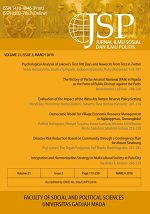The Role of Commissioners in Health Service Provision: Lessons Learned from Primary Care Trusts (PCTs) England
Pradhikna Yunik Nurhayati(1*), Barbara Allen(2)
(1) Graduate Institute of Political Economy, National Cheng Kung University, Taiwan
(2) School of Government, Victoria University of Wellington, New Zealand
(*) Corresponding Author
Abstract
It is the government’s responsibility to reach policy outcomes. Since the needs of citizen vary, the government needs to improve the way it delivers public services. Monopolistic provision of public service by government becomes inadequate to fulfill the needs of the community. One of the ways pursued by the government is working with the third sector, through procurement and commissioning. National Health Services (NHS) in the UK is one of the examples of commissioning in the healthcare service. The role of commissioning has been done by Primary Care Trusts (PCTs) from 2002 until 2014. Since commissioning became the center of public health provision, the role of commissioners has become pivotal. Using systematic review, this study aims to examine the role of commissioners in health service provision in England. It can be concluded that commissioners (PCT) play an essential role in identifying the needs of the community. This early stage of planning relied on the knowledge, skills, and capacity of commissioners. Unfortunately, not every commissioner has the capability to perform the commissioning process. Therefore, a partnership with other stakeholders is critical to overcoming the limitations of resources, including the capacity, time, and funding. The other findings suggest that national policy by the central government has contributed to the success of commissioning. Results revealed that national targets often prevented commissioners from reaching the local targets, especially when resources were insufficient.
Keywords
Full Text:
PDFReferences
Aveyard, H. (2010). Doing a Literature Review in Health and Social Care. Berkshire: McGraw- Hill
Allen, B., Wade, E., & Dickinson, H. (2009). B r i d gi n g th e d i v i d e – c o m m e r c i a l pro c ur em e nt an d s upply c ha in management: are there lessons for healthcare commissioning in England? Journal of Public Procurement, 9(1), 505-534.
Banks, K. N. (2010). Involving local people to improve service. British Journal of Healthcare Management, 16(1), 10-17.
Baxter, K., Weiss, M., & Le Grand, J. (2008). The dynamics of commissioning across organizational and clinical boundaries. Journal of Health Organization & Management, 22(2), 111-128.
Bovaird, T. (2004). Public-private partnership: from contested concepts to prevalent practice. International Review of Administrative Sciences, 70(2), 199-215.
Bovaird, T. (2006). Developing new forms of partnership with the market in the procurement of public services. Journal of Public Administration, 84(1), 81-102.
Cabinet Office. (2006). Cabinet Office Partnership in public services: an action plan for the Third Sector involvement. London: Cabinet Office.
Gridley, K., Spiers, G., Aspinal, F., Bernard, S., Atkin, K., & Parker, G. (2012). Can general practitioner commissioning deliver equity and excellence? Evidence from two studies of service improvement in the English NHS. Journal of Health Services Research & Policy, 17(2), 87-93.
Klee, D. (2009). Reconciling putting people first and world class commissioning: A case study. Journal of Integrated Care, 17(2), 27-34.
Maybin J., Addicott R., Dixon, A., & Storey, J. (2011). Accountability in the NHS: Implications of the government’s reform programme. London: The King’s Fund.
McCaffert y, S., Williams, I., Hunter, D., Robinson, S., Donaldson, C., & Bate, A . ( 2 0 1 2 ) . I m pl e m e n ti n g w o r l d c l a s s commissioning competencies. Journal of Health Services Research & Policy, 17(1), 40-48.
Office of Government Commerce. (2008). An introduction to public procurement. London: Office of Government Commerce.
Orton, L. C., Lloyd-Williams, F., Taylor-Robinson, D. C., Moonan, M., Oflaherty, M.,& Capewell, S. (2011). Prioritising public health: A qualitative study of decision making to reduce health inequalities. BMC Public Health, 11(1). doi:10.1186/1471-2458-11-821
Shaw, S. E., Smith, J. A., Porter, A., Rosen, R., & Mays, N. (2013). The work of commissioning: A multisite case study of healthcare commissioning in Englands NHS. BMJ Open, 3 (9). doi:10.1136/bmjopen-2013-003341
Shircore, R., & Ladbury, P. (2009). From service delivery to solution delivery: Commissioning for health improvement. Perspectives in Public Health, 129(6), 281-287.
Smeltzer, L. R., & Ogden, J. A. (2002).‘Purchasing professionals perceived differences between purchasing materials and purchasing services’. Journal of Supply Chain Management, 38(1), 54-70.
Tranfield, D., Denyer, D., & Smart, P. (2003). Towards a Methodology for Developing E vid enc e-Inform ed M anagem ent Kno w led ge by M ea ns o f S ys tem atic Review. British Journal of Management, 14(3),207-222. doi:10.1111/1467-8551.00375
Vergel, Y. B., & Ferguson, B. (2006). Difficult commissioning choices: lessons from English primary care trusts. Journal of Health Services Research & Policy, 11(3), 150-154.
Wade, E. (2011). Commissioning reform in the NHS: will he who pays the piper ever really call the tune?. Clinical Medicine, 11(1), 35-39.
Wade, E., Smith, J., Peck, E., & Freeman, T. (2006). Commissioning in the reformed NHS: policy into practice. Birmingham: Health Service Management Centre.
William, I., Bovaird, T., Brown, H., Allen, K., Dickinson, H., Kennedy, J., & Glasby, J. (2012). Designing whole-systems commissioning: Lessons from the English experience. Journal of Care Sevices Management, 6(2), 83-92.
Woodin, J. (2006). Health care commissioning and contracting. In K. Walshe & J. Smith (Eds.), Healthcare Management. Maidenhead, UK: Open University Press.
Article Metrics
Refbacks
- There are currently no refbacks.
Copyright (c) 2018 Jurnal Ilmu Sosial dan Ilmu Politik

This work is licensed under a Creative Commons Attribution-NonCommercial-NoDerivatives 4.0 International License.






















